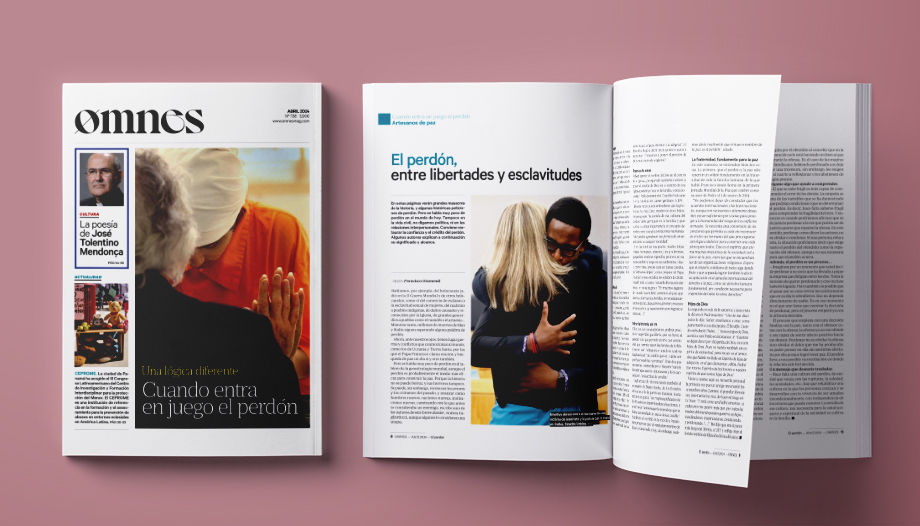Forgive and be forgiven. Easter brings to the rhythm of the Church's liturgy the mystery that gives meaning to faith: the resurrection of Christ and, with it, the recovery of the grace of the children of God, the breaking of the chains of death resulting from sin. God's forgiveness emerges as the source of life and the model of the necessary forgiveness among men.
The difficult act of forgiveness
Few realities are as complex and difficult to deal with as the sorry. Forgiving and being forgiven is the focus of this April 2024 dossier. To this end, the magazine approaches this question from different angles.
Psychologist Patricia Díez unpacks the importance of forgiveness as the basis of human relationships, in an interview in which Díez defines forgiveness as an act of love, "a taking of a position before a person and before an evil that is presented to us; one chooses to love the person, but not the evil committed. In this sense, the person who forgives recognizes the evil and values it as such, but does not equate the bad action with the subject who commits it, but is able to see in him a person worthy of being loved in spite of his mistakes".
Andrea Gagliarducci delves into the historical requests for forgiveness embodied in the life of St. John Paul II and those that seem necessary today, as in the case of the conflict between Russia and Ukraine.
Mariano Crespo, for his part, unpacks the meaning of the "purification of memory" and the affirmation of human dignity that an act of forgiveness entails. The dossier ends with an interesting article by Fernando del Moral on forgiveness as a sacrament of the Church: Confession.
Synod moves forward
The Synod of Synodality also has more than one place in the April 2024 issue of Omnes magazine. Not surprisingly, the missive sent to Cardinal Mario Grech by Pope Francis indicating the path of this work, with the creation of specific groups and the reservation of some topics, has once again brought the synodal process to the forefront.
This new path is referred to in the This month's Tribune, Bishop Vicente JiménezApostolic Administrator of the dioceses of Huesca and Jaca and coordinator of the Synodal Team of the Spanish Episcopal Conference for the Synod of Bishops, which is analyzing the forms of work proposed.
Our editor in Rome, Giovanni Tridente has interviewed Fr. Giacomo Costa, SJ, Special Secretary of the Synodal Assembly, who explains the new method of work of the Synod of Synodality based on the Working Groups. These groups, coordinated by the Synod Secretariat, will have input from around the world.
The Pope's teachings This month's issue focuses on the Pope's words, which in March touched on such sensitive topics as the scope of gender ideology, insisting that man and woman are the image of God, and the educational work of the Church, which the Pope recalled has been carried on throughout the centuries. Then and now we are driven by the same great hope that springs from the Gospel, with which we look at everyone, beginning with the youngest.
Anti-abuse work and a German theologian
The work of the Latin American Council of the Center for Interdisciplinary Research and Training for the Protection of Minors, CEPROME, a reference institution in the work of training in the prevention of sexual abuse in ecclesiastical environments for Latin America, is the focus of this magazine's theme in America.
Last March, CERPOME held the third of its congresses focused, in this edition, on the concept of vulnerability. One of its speakers, Luis Alfonso Zamorano, points out in an interview contained in this issue, the importance of accompaniment, listening and healing processes of the victims of abuse.
Juan Luis Lorda's Twentieth Century Theology focuses on "Una mystica persona" by Heribert Mühlen, a German author who was associated with the Charismatic Renewal and whose theses, in Lorda's opinion, "continue to contribute to renewing the theology of the Holy Spirit and the Church. There are nuances to the transfer between the grammar of pronouns and the ontology of persons".
For his part, Reverend SOS delves into Spatial Computing, "a form of processing that considers three-dimensional space as a scenario for interacting with digital systems" and that can become an ally in the task of formation and catechesis.
World War III
Our Reasons report, on the other hand, delves into the reality of the "third world war in pieces", as the Pope calls an international panorama marked by instability and conflicts. The report covers the international political panorama from the war in Ukraine or the Holy Land to the various conflicts in Africa, America, China and India, among others.
In the last pages, the culture section, Carmelo Guillén brings the poetry of Cardinal Jose Tolentino Mendonça, prefect of the Dicastery for Culture and Education and one of the most representative voices of the latest Portuguese lyric poetry.
The content of the magazine for the month of April 2024 is available in its digital version (pdf) for subscribers of the digital and print versions.
In the next few days, it will also be delivered to the usual address of those who have the subscription printed.









